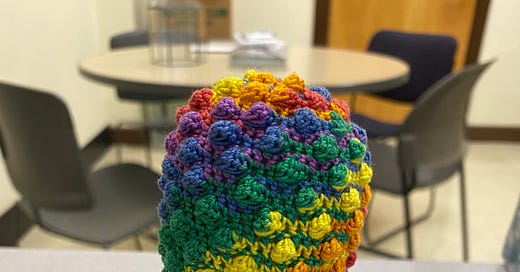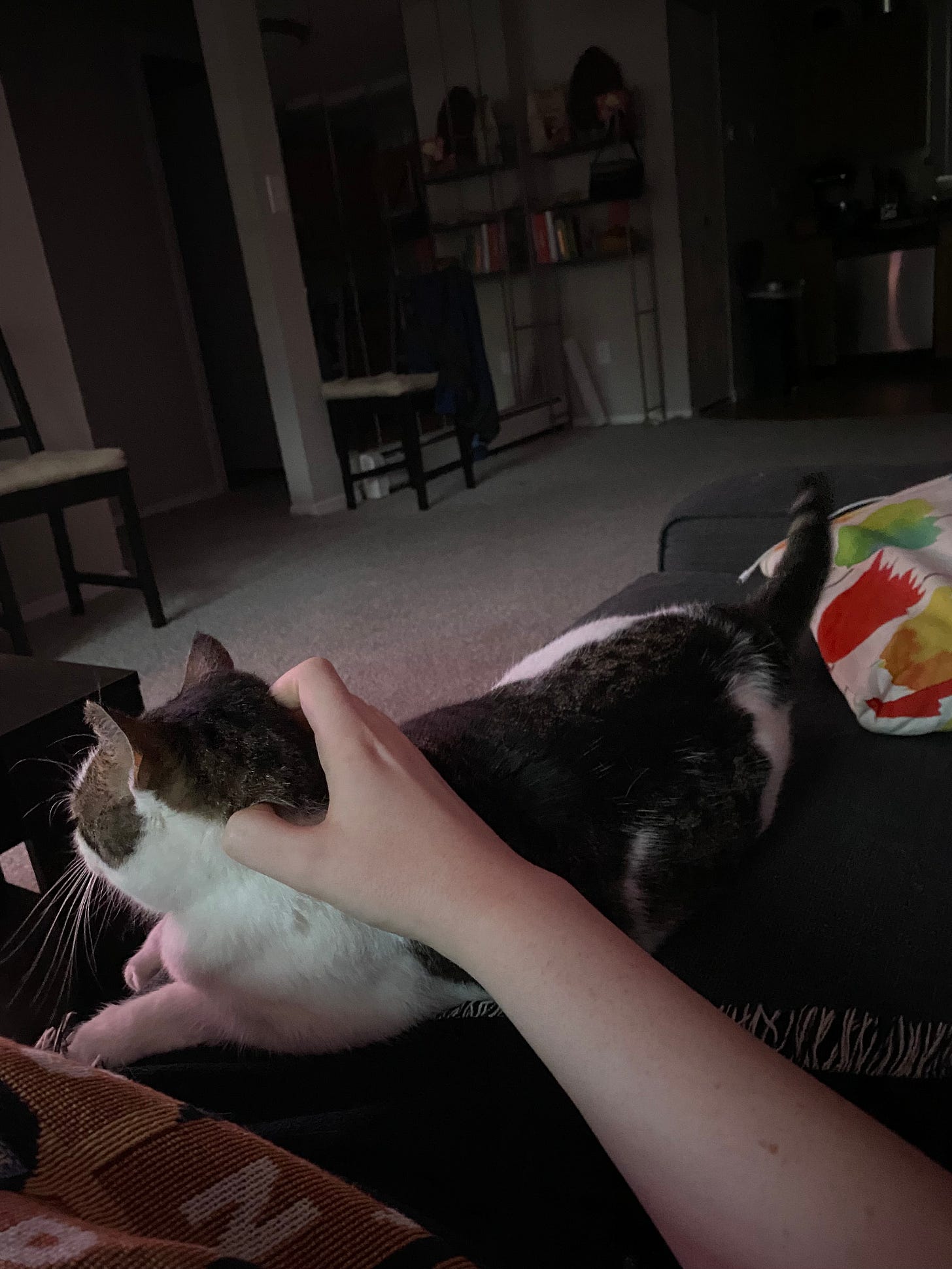I started my new job at UMass one month ago, and I am absolutely thrilled to be here. Every single day I think “another day at my dream job!”, either when I’m walking into my office in the morning or leaving my office in the afternoon. Obviously, working at a massive institution like a university comes with problems (the subject of future newsletters…), but right now I’m simply enjoying the fact that every day I get to do what I love doing: teaching, interacting with students, and meeting really cool people. (“Cool”, here, meaning people in STEM, queer/trans people, people operating in the JEDI/DEI space, and sometimes all three at once!!)
I’ve been meeting a lot of new people in the past month, and one question that consistently comes up in conversation has been “so what brought you to UMass?” or “what made you decide to come here?” The short answer is, “I was given two offers, one at Johns Hopkins and one at UMass, and I decided I would be more comfortable here.”
This essentially the truth. In the time when I still had the two offers to choose from, I made a TikTok video where I talked about both job offers with the sound removed, asking my audience to tell me which offer I should pick based off body language alone. I firmly believe that body language is junk science and no serious use of it should be taken as legitimate. And yet, in this particular comment section, I was read for filth. When talking about JHU, I was visibly more reserved, as if to say “this job would pay me more money but would come with a lot of caveats and responsibilities that I’m not ready to commit to”. When talking about UMass, I was visibly excited; partially at the chance to live in an area that I’ve called a second home for years, partially because I would be teaching a course that I’d prefer to teach, and partially because I wouldn’t be the only openly queer person in the department.
I could talk for hours about the nuances of teaching faculty positions—how to apply for them, what to look out for when doing your interviews, how to pick between multiple offers, and more—and if you’re an aspiring teaching faculty and you’re interested in hearing about that stuff, absolutely comment below or shoot me an email (hello@ThatAnnaMarie.com) so we can chat!
But if I’m being realistic, I chose my comfort and my happiness above all else. I chose it above prestige; working at Johns F’ing Hopkins certainly would be a flex to all my many, many haters. I certainly chose it above money; JHU offered a six-figure salary, UMass did not. And I chose it above living in Baltimore, a really cool city with a lot of great activist work to plug into.
When I think about why I chose UMass, most of the reason is that I would be in contact with lots of other queer people in STEM. Obviously, there is a huge queer community in Baltimore, but what I specifically wanted was a queer STEM community at my actual job. At UConn, I was the only out queer lecturer in the department. At JHU, it would have been the same. At UMass, however, the Chemical Engineering department has the wonderful Sarah Perry and the amazing Shelly Peyton, both of whom have made it a point to consistently check in with me to make sure I have everything I need now that I’m here, and one of whom KNITTED ME A RAINBOW CACTUS????
I can confidently say that this would not have happened at JHU. And it’s more than an interpersonal matter of “having others around me that are like me”, although this is important; it has to do with my actual teaching work. I needed colleagues who are open to new, innovative forms of engineering instruction that incorporate queerness, anti-racism, disability justice, and other ways of acknowledging that science is used as a tool for systemic oppression. The folks I talked to at UMass were incredibly interested in these ideas, and were willing to offer help and resources. The folks at JHU seemed like they would have put me in a box labeled “DEI stuff” and stuck me in a corner. I’m sure would have been able to do some amazing things there. But the resources and support for radical, queer, and transformative teaching methods at UMass far exceeded what I saw at Hopkins, at least during my interview process.
Also, for me at least, state school kids are WAY easier to work with than private school kids. No offense to anyone from Hopkins, but if you’re a student who freaks out when they get an A-, you’re probably not gonna do well in my classes, where I fully plan to abolish numerical grades in favor qualitative, relevant feedback. (More on that in future newsletters.) Then there’s the fact that big cities make my head spin; when I visited Baltimore as part of my interview, I spent a good chunk of time in my hotel room recovering from the exhaustion of navigating a city. She needs wide open spaces!!
Finally, Hopkins offered me the standard 1-year teaching contract, whereas UMass offered me a 4-year contract from the jump, which more or less sealed the deal for me. I’m looking to plant my roots somewhere, not hop from city to city every year (which, I remind you, would have involved a whole other very-long faculty interview process). Perhaps I could have worked at the prestigious Hopkins for a year, gathered all their precious Elite Private College Secrets, and then left for a UMass-type school to implement those secrets in my “ideal” teaching setting. Part of me also had this fear of judgement from others; “Oh, isn’t UMass just like UConn? Don’t you want to aspire to more? You don’t want your experience limited to rural New England, do you?” And this is true, Hopkins could have opened a lot of doors for me. But the question is, do I even want to walk through those doors? What if working at an R1 state school like UMass was my endgame? If that’s the case, why work at a Hopkins first when I could just go straight to a UMass?
As a trans person in STEM, I’m glad I put my well-being above a paycheck or prestige. I’m currently weaving together the connective tissue of a podcast episode all about algorithmic bias, specifically on TikTok, specifically against trans people. The impetus for this was thinking about how valuable IRL queer community is. If my recent body of work can be summarized into one statement, it would probably be, “mediating our relationships via digital means is bad for all of us, but it disproportionately impacts marginalized communities”. Us trans people live and die by our social networks, making spaces like “Trans TikTok” incredibly important, incredibly complex, and potentially, incredibly dangerous. It also means that, when we have a choice, we should always choose each other.
Look forward to more on this next week as I finish up my latest podcast episode. In the meantime, remember to take care of yourselves!
Currently Reading
A mainly-capitalist perspective on why all social media sites are shifting to an algorithm-based model. In my opinion, this represents a power shift from users and content creators back to platform holders.
The Toaster Project was an attempt to make a simple kitchen appliance from scratch, without any of the existing manufacturing infrastructure that currently exists to make toasters. As it turns out, if you were to turn all the necessary raw materials needed to make a £3.94 toaster into a functioning toaster, it would cost £1187.54 (plus a LOT of labor).
It turns out that Silicon Valley CEOs like Elon Musk are exactly as ignorant about the industries they’re trying to disrupt as their tweets let on.
Watch History
Dr. Fatima is asking the right questions about diversity in STEM (seriously, this is the best video I’ve seen in a while!!)
Noah Samsen on the infrastructure of online transphobia.
Jouelzy’s excellent history of monogamous, hetero marriage as an economic phenomenon, including the subjugation of Black women in the early American household.
A deep dive into the GOP’s unforgivable Martha’s Vineyard stunt, where Florida officials tricked fifty migrants into leaving the South for Massachusetts. Republicans truly have no soul!!
Innuendo Studios is back with a new Alt-Right Playbook video. The entire playlist is a must-watch!
Bops, Vibes, & Jams
The new Dua Saleh record is great! Fav track: day to day.
I’ve been revisiting a classic autumn record this week: Phoebe Bridgers’ and Conor Oberst’s Better Oblivion Community Center.
And now, your weekly Koko.
That’s all for now! See you next week with more sweet, sweet content.
In solidarity,
-Anna





